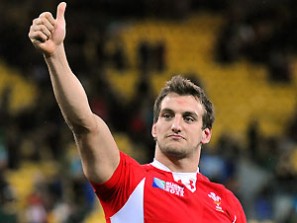Europe’s finest will pack all manner of feelings, alongside the passports and good behaviour guides, as they depart for a three-pronged assault on the southern hemisphere.
There will be excitement, trepidation and perhaps a touch of less-than-sincere gratitude to their administrators for arranging the a three-Test series at the end of a gruelling schedule that reads World Cup, domestic grind through winter, Six Nations, domestic finals and outbound tour.
Emanating from each camp will be the usual reassurances that they are getting on that plane to win every Test, but I suspect a truer state of affairs can be summed up like this: expectation (Wales), hope (Ireland) and wishful thinking (England).
Predictions about this Wallabies v Wales series are based on shifting sands, which seem to be moving almost daily based on a flurry of medical updates: first Kurtley Beale is on the surgeon’s slab and then suddenly in contention again; Ben Lucas is initially excluded but now has proved his fitness; and Warren Gatland might make it out of his wheelchair for the second Test.
The Wallabies’ news might be enough to send fans with a nervous disposition scurrying towards the drinks cabinet. The unpleasant footage of James Horwill’s injury immediately made you wonder about its severity and those fears appear to be justified. There is no obvious replacement for the big man and Nathan Sharpe’s pace around the park is befitting of a man now in the final stages of a long race.
The reason why Horwill will be missed so much is because – despite a bewildering array of names being proposed this week – the Wallabies are, in reality, fairly settled in terms of selection. There is a core of about a dozen players who, injury permitting, will play most games and the captain is clearly at that top table. Additionally, while there might be up to four options of comparable quality to cover No.6/No.8, the shelf directly below Horwill is emptier.
It is just speculation but his demise adds to the feeling that any potential physical advantage enjoyed by Australia, due to the length of the Welsh players’ season and their long trek from home, might be dwindling.
The Welsh, moreover, have developed a reputation for being one of the most meticulously prepared teams in the world. It does not always tally with a previous reputation of relishing the game’s more social aspects, but sports science has become one of their weapons.
Their whip-cracker is a former AIS man, Adam Beard, and their cryotherapy sessions have entered folklore. Crucially, their players believe they are the fittest in the world. They believe they can go into the last 20 minutes with enough in the tank to close out the tight games. And belief is half the battle for sides heading to the southern hemisphere.
The Irish mood as they head to New Zealand is much less sanguine.
Leinster might have won a third consecutive Heineken Cup but all that has done is cast a light on the contradiction between sustained provincial success and Test mediocrity. Coach Declan Kidney is a man under pressure, with questions being asked about how the Kiwi coaching set-up at Leinster can get the best out of Johnny Sexton and company while they struggle to reproduce that in green shirts.
And despite the strong links between the countries, the Irish don’t give much attention to chatter about the departure of Jerome Kaino and the form of Ali Williams. The presumption is that the 22 men the All Blacks put out will be ready to play come Test time. Besides, the Irish win column remains naked in contests between the two. Expectations are being played down, especially as Stephen Ferris has been lost to injury and Paul O’Connell is a major doubt. But that might not be a bad thing this time around.
England, however, are in a different position.
Perhaps emboldened by an entertaining final (take note, Brumbies and Reds) to wrap up their domestic season and a run in the sun against the Barbarians, commentators such as Will Greenwood have been wondering aloud if England could do something in South Africa.
Green shoots of recovery under new coach Stuart Lancaster have been detected after a comical World Cup campaign.
I am not so sure. The English were coming off a very low base post-New Zealand and although they destroyed Ireland in the final Six Nations game, Andy Farrell’s subsequent rejection of the back-line coaching job has muddied the waters. Wayne Smith also declined the opportunity so Mike Catt is now in charge of attack. From the outside the coaching set-up looks a little green.
They have also lost blindside breakaway Tom Croft, who flourished on the hard South African grounds during the Lions tour of 2009, and are sweating on the availability of Manu Tuilagi, probably their only back who can consistently challenge the gainline.
Conversely, expect the South Africans to have a lot of clarity about their work, even though they are under a new coach. With preparation time limited they will keep it simple. And while Northern Hemisphere journalists still make a sport of taunting Super Rugby about a lack of tackling, the South Africans have enough heavy ball carriers to pummel England into submission and resist any counter punches.
England will do well to avoid a whitewash in the Republic.
Indeed, of the nine Tests played in the three series, it is difficult to find more than a combined total of two, perhaps three, wins for the touring sides.
I think Australia have enough to win their series, but it’s a belief founded on those uncertain and shifting sands mentioned earlier.





























































































